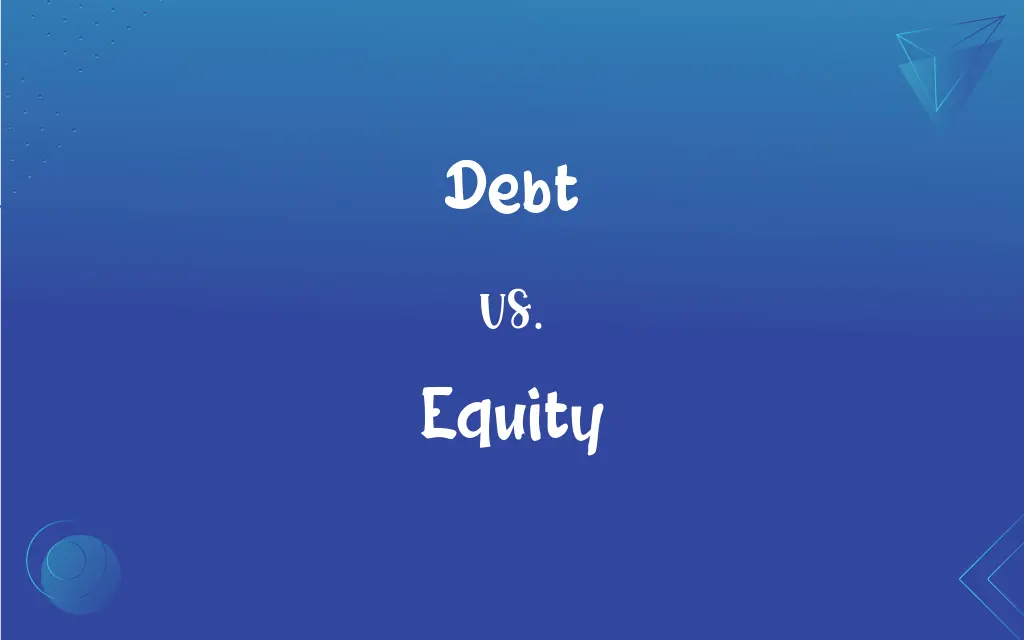Debt vs. Equity: What's the Difference?
Edited by Aimie Carlson || By Harlon Moss || Updated on October 25, 2023
Debt is borrowed money that must be repaid with interest, while equity represents ownership in an asset or company.

Key Differences
Debt refers to funds that are borrowed and need to be repaid at a future date, usually with interest. On the other hand, equity denotes ownership in an asset or entity, offering a claim to a portion of its profits and losses. Debt often comes from external sources like banks or bondholders, requiring regular payments to fulfill the borrowing agreement. In contrast, equity might come from shareholders who invest capital in exchange for shares in the company.
Debt is a liability for a company or individual, signifying an obligation to repay the borrowed amount. Equity, conversely, is seen as a form of capital provided by the owners or shareholders of the entity. When an individual or company cannot repay their debt, they may face legal implications or insolvency. However, equity, being an ownership stake, does not have such fixed repayment terms and is contingent on the performance of the asset or business.
The cost of debt is typically the interest paid on the borrowed amount. Equity, in contrast, has a cost associated with the expected return on investment for shareholders. Debt holders, as creditors, have a priority claim on assets and earnings before equity holders in the event of a liquidation. On the flip side, equity holders have the potential to benefit from capital appreciation and dividends but stand behind debt holders during financial distress.
Issuers of debt, such as companies taking loans, have an obligation to make periodic interest payments and repay the principal at maturity. Equity investors, such as shareholders in a company, do not receive such fixed payments but instead hope for dividends and an increase in the value of their shares. Debt instruments come with a defined tenure, post which the principal is repaid. Equity investments, however, do not have a maturity and remain as long as the investor holds the shares.
Comparison Chart
Nature
Obligation to repay borrowed funds
Ownership stake in an asset or company
ADVERTISEMENT
Returns
Fixed interest payments
Dividends and capital appreciation
Risk
Legal implications for non-payment
Loss of investment if asset or company fails
Duration
Defined maturity date
No maturity; lasts as long as held
Priority in Liquidation
Paid before equity holders
Paid after debt holders
Debt and Equity Definitions
Debt
Debt involves borrowed money that carries interest.
Their mortgage is the largest debt they have.
ADVERTISEMENT
Equity
Equity represents ownership in a company or asset.
Mark has 5% equity in the startup.
Debt
Debt is money owed by one party to another.
Jane took on significant debt to pay for her college education.
Equity
Equity shareholders are entitled to a portion of the company's profits.
As an equity shareholder, Lisa receives dividends when the company performs well.
Debt
Debt can be secured (backed by collateral) or unsecured.
Credit card debt is typically unsecured, while a car loan is secured.
Equity
Equity can refer to the value of an owned property minus any owed amounts.
After years of mortgage payments, their home equity has increased significantly.
Debt
Debt is an obligation to repay borrowed funds.
The company's rising debt was a concern for its investors.
Equity
Equity offers a claim on an entity's residual assets after debts are paid.
If the company liquidates, equity holders will be paid after all debts are settled.
Debt
Debt signifies a creditor-debtor relationship.
The national debt has been a topic of debate for decades.
Equity
Equity also denotes fairness and justice.
The organization promotes equity in access to healthcare services.
Debt
Something owed, such as money, goods, or services
Used the proceeds to pay off her debts.
A debt of gratitude.
Equity
The state or quality of being just and fair.
FAQs
Can a company finance its operations without debt?
Yes, a company can use equity financing by selling shares instead of taking on debt.
What's the cost of equity?
It's the return required by equity investors given the risk of the investment.
What's the significance of the debt-to-equity ratio?
It measures a company's financial leverage, comparing its total debt to total equity.
Can an individual's equity be negative?
Yes, if liabilities exceed assets, resulting in negative net worth.
What is the fundamental distinction between debt and equity?
Debt is borrowed money requiring repayment, while equity signifies ownership in an asset or company.
Are bonds a form of debt?
Yes, bonds represent loans made by investors to issuers.
How do interest rates affect debt?
Higher interest rates increase the cost of borrowing, affecting the attractiveness of taking on debt.
Why do companies prefer debt over equity at times?
Debt might offer tax benefits, and companies retain ownership without diluting shares.
What happens to debt if a company goes bankrupt?
Debt holders are among the first to be repaid from the company's assets in bankruptcy.
What's the benefit of having equity in a home?
Home equity can be used as collateral for loans or be accessed through sale or refinancing.
Can debt be beneficial for businesses?
Yes, strategic debt can leverage growth, and interest might be tax-deductible.
Are there other financing methods besides debt and equity?
Yes, hybrids like convertible bonds or preferred stocks blend features of both debt and equity.
Do equity holders get fixed returns like debt holders?
No, equity holders receive returns based on company performance, not fixed payments like debt holders.
Which is riskier, debt or equity?
Both have risks. Debt carries repayment obligations, while equity risks the loss of investment.
Is it possible to convert debt into equity?
Yes, some debt instruments have provisions allowing conversion to equity.
Which has a higher claim on assets during liquidation, debt or equity?
Debt has a higher claim and is paid before equity during liquidation.
Can individuals have equity in assets other than companies?
Yes, for instance, individuals can have equity in real estate properties.
Are dividends guaranteed for equity shareholders?
No, dividends are contingent on company profits and board decisions.
Does equity dilute as more shareholders join?
Yes, issuing more shares dilutes the equity stake of existing shareholders.
Do equity shareholders have a say in company decisions?
Typically, yes. Equity shareholders often have voting rights in company matters.
About Author
Written by
Harlon MossHarlon is a seasoned quality moderator and accomplished content writer for Difference Wiki. An alumnus of the prestigious University of California, he earned his degree in Computer Science. Leveraging his academic background, Harlon brings a meticulous and informed perspective to his work, ensuring content accuracy and excellence.
Edited by
Aimie CarlsonAimie Carlson, holding a master's degree in English literature, is a fervent English language enthusiast. She lends her writing talents to Difference Wiki, a prominent website that specializes in comparisons, offering readers insightful analyses that both captivate and inform.































































